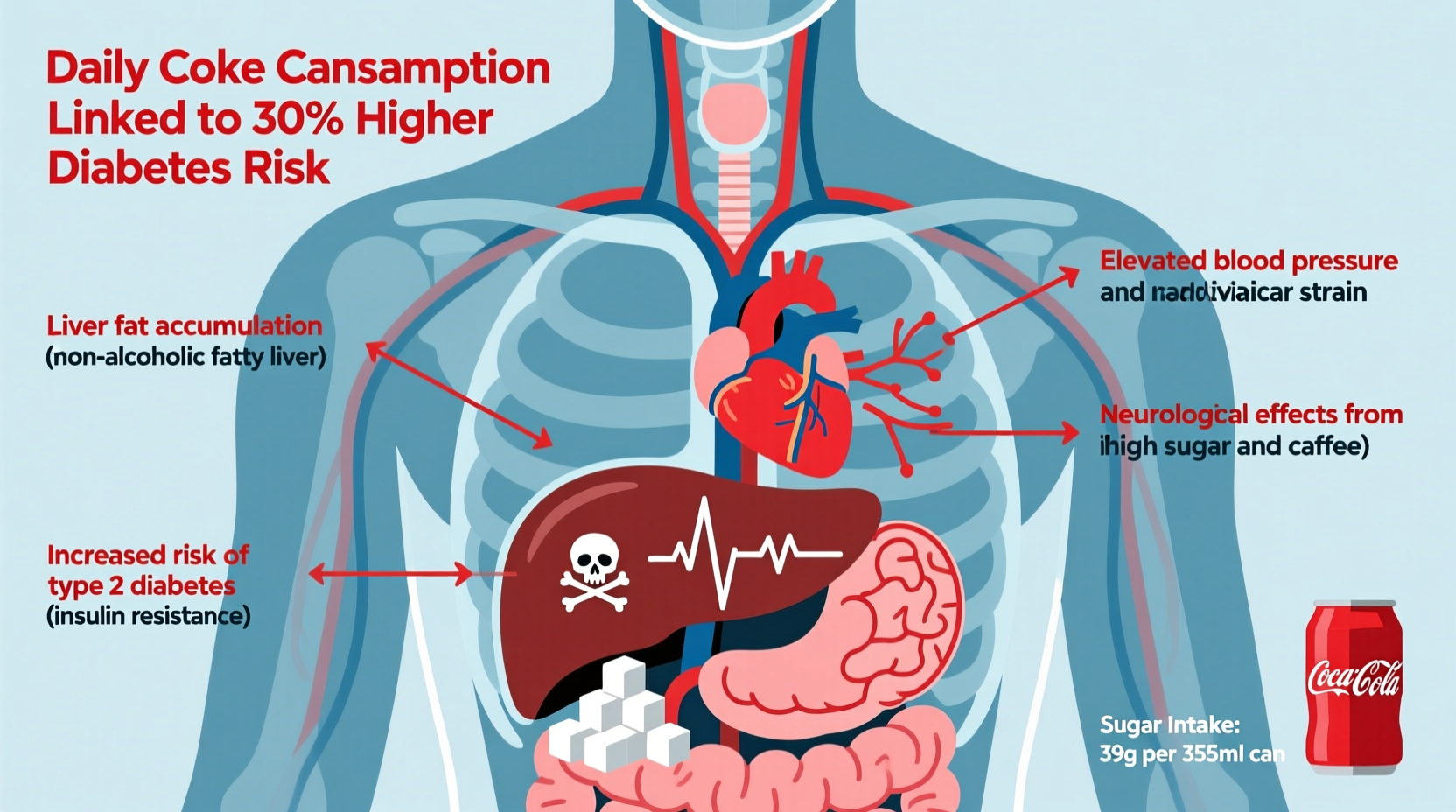Coca-Cola, one of the most recognizable soft drinks in the world, has been a staple in refrigerators and convenience stores for over a century. While its refreshing taste and effervescence make it a popular choice, mounting scientific evidence reveals that regular consumption poses serious health risks. From blood sugar spikes to increased risk of chronic disease, the ingredients in Coke—especially high fructose corn syrup, caffeine, and phosphoric acid—can harm your body in multiple ways. Understanding these effects is essential for making informed dietary choices.
The Hidden Sugar Bomb in Every Can

A standard 12-ounce can of Coca-Cola contains approximately 39 grams of sugar—nearly 10 teaspoons. That’s more than the American Heart Association’s recommended daily limit for women (25g) and close to exceeding the limit for men (36g). This concentrated dose of sugar enters the bloodstream rapidly due to the liquid form, causing a sharp spike in blood glucose and insulin levels.
Repeated sugar surges contribute to insulin resistance, a precursor to type 2 diabetes. Over time, the pancreas struggles to keep up with insulin demand, increasing the risk of metabolic syndrome. Liquid sugar, unlike solid food, doesn’t trigger satiety signals effectively, meaning people often consume extra calories without feeling full.
Impact on Weight and Obesity
Regular soda consumption is strongly linked to weight gain and obesity. A Harvard School of Public Health study tracking over 120,000 adults found that those who increased their sugary drink intake gained more weight over time compared to those who reduced or eliminated them.
Unlike whole foods, sugary drinks offer \"empty calories\"—calories with no nutritional value. Because liquid calories don’t suppress appetite, they add to total caloric intake rather than replacing other foods. Over months and years, this imbalance leads to gradual fat accumulation, particularly visceral fat around the abdomen, which is associated with higher cardiovascular risk.
“Sugary drinks are the single largest source of added sugar in the American diet and a major driver of the obesity epidemic.” — Dr. Frank Hu, Professor of Nutrition and Epidemiology, Harvard T.H. Chan School of Public Health
Dental Damage from Acids and Sugar
The combination of sugar and acids in Coke creates a perfect storm for tooth decay and enamel erosion. Bacteria in the mouth feed on sugar, producing acids that attack tooth enamel. Meanwhile, phosphoric acid—a key ingredient in cola—directly weakens enamel through chemical erosion.
Studies show that frequent soda drinkers have significantly higher rates of cavities and dental sensitivity. Even diet versions, while sugar-free, still contain phosphoric and citric acids that erode enamel over time. The damage is compounded when soda is sipped slowly throughout the day, prolonging acid exposure.
| Risk Factor | Regular Coke | Diet Coke |
|---|---|---|
| Sugar Content | High (39g per can) | None |
| Acid Content | High (phosphoric acid) | High (phosphoric acid) |
| Enamel Erosion Risk | Very High | High |
| Cavity Risk | Very High | Low |
Long-Term Metabolic and Organ Effects
Beyond immediate spikes in blood sugar, regular Coke consumption affects internal organs. The liver processes fructose—the primary sugar in high fructose corn syrup—much like alcohol. Excessive intake can lead to non-alcoholic fatty liver disease (NAFLD), a condition once rare but now affecting up to 25% of adults in the U.S.
Phosphoric acid may interfere with calcium absorption, potentially weakening bones over time. Some observational studies suggest a link between high cola intake and lower bone mineral density in women, especially those with low calcium diets.
Caffeine, present at about 34mg per can, can cause insomnia, anxiety, and increased heart rate in sensitive individuals. When combined with sugar crashes, this contributes to energy fluctuations, mood swings, and dependency on stimulants for alertness.
Cardiovascular Risks and Inflammation
Emerging research connects sugary drink consumption with increased risk of heart disease. A 2019 study published in Circulation found that individuals who drank two or more sugary beverages daily had a 31% higher risk of dying from cardiovascular disease compared to those who drank less than one per month.
Chronic inflammation plays a central role. High sugar intake elevates inflammatory markers like C-reactive protein (CRP), which are linked to atherosclerosis—the buildup of plaque in arteries. Additionally, soda consumption is associated with elevated triglycerides and lowered HDL (\"good\") cholesterol, both of which worsen heart health profiles.
Mini Case Study: John’s Wake-Up Call
John, a 42-year-old office worker, consumed 2–3 cans of Coke daily for over 15 years. He believed he was healthy because he wasn’t overweight. During a routine check-up, his doctor discovered elevated liver enzymes, prediabetes, and high triglycerides. After eliminating soda and adopting a balanced diet, John reversed his prediabetic status within six months and reported better energy and focus. His story highlights that metabolic damage from soda isn’t always visible on the scale.
What About Diet Coke?
Diet Coke swaps sugar for artificial sweeteners like aspartame, acesulfame K, and sucralose. While it avoids sugar-related issues, concerns remain. Some studies suggest artificial sweeteners may disrupt gut microbiota and alter glucose metabolism, potentially leading to increased appetite and cravings for sweets.
A 2017 review in Current Opinion in Clinical Nutrition and Metabolic Care noted that while diet sodas help reduce calorie intake short-term, long-term use does not consistently lead to weight loss and may be linked to increased waist circumference in older adults.
Checklist: How to Reduce Your Soda Intake
- Track your current soda consumption for one week
- Set a goal to cut back by one can every three days
- Replace soda with herbal tea, infused water, or sparkling water
- Avoid keeping soda at home to reduce temptation
- Read labels—watch for hidden sugars in juices, sports drinks, and flavored coffees
- Drink a glass of water before reaching for a soda
- Seek support from friends or family making similar changes
Frequently Asked Questions
Is one Coke a day okay?
While an occasional soda is unlikely to cause harm, daily consumption adds up. One can a day exceeds recommended added sugar limits and increases long-term risks for diabetes, fatty liver, and heart disease. Moderation is key—limiting intake to once a week or less is safer.
Can drinking Coke cause diabetes?
Regular consumption of sugary drinks like Coke is a well-established risk factor for type 2 diabetes. A meta-analysis of over 300,000 participants found that each additional daily serving of sugar-sweetened beverage increases diabetes risk by 26%. The rapid sugar delivery and lack of fiber accelerate insulin resistance.
Does Coke dehydrate you?
Coke contains water but also caffeine, a mild diuretic. While moderate amounts don’t cause dehydration, excessive intake may increase urine output and fluid loss. Moreover, the high sugar concentration can slow hydration compared to plain water. It’s not an effective rehydration drink, especially after exercise.
Conclusion: Making Healthier Choices
The evidence is clear: regular consumption of Coca-Cola—whether regular or diet—poses significant health risks. From spiking blood sugar and damaging teeth to contributing to heart disease and liver dysfunction, the costs far outweigh the momentary pleasure of a cold, fizzy drink. The good news is that small, consistent changes can make a big difference.
Start by reducing portion sizes, switching to healthier alternatives, and becoming aware of how often you reach for a soda out of habit rather than thirst. Your body will respond quickly—better energy, stabilized moods, and improved metabolic markers are often noticeable within weeks.









 浙公网安备
33010002000092号
浙公网安备
33010002000092号 浙B2-20120091-4
浙B2-20120091-4
Comments
No comments yet. Why don't you start the discussion?